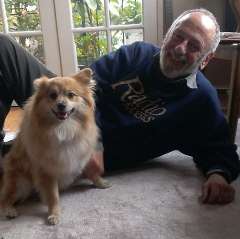A hi-tech production of Mozart’s Don Giovanni dominated by Lucas Meachem in the title role opened the LA Opera season on Saturday. It was created by Kasper Holten in 2014 and has previously been seen at London’s Royal Opera House (with many revivals), Barcelona’s Gran Teatre del Liceu, Houston Grand Opera and the Israeli Opera.
It is a clear and powerful staging that takes more interpretive than musical risks. It is jarringly sympathetic to Don Giovanni himself: he tries to avoid the duel with the Commendatore and then cradles the dying man in his arms to give comfort; the assault Donna Anna repels in Mozart is downgraded to consensual sex, and the existential fate Don Giovanni suffers at the end, similar to Sartre’s No Exit rather than being carried off by demons to hell, has an everyman feel to it. During the pantomime with which the opera ends, the Don is still present, but cannot be seen nor heard.
Lucas Meacham sang an oppressively menacing, brooding, defiant Don Giovanni, Fabio-like in size, presence, beauty and personality. It was Mozart at his most seductive and charming, but physically intimidating too, capturing those flashes of impossible beauty and threats of terrible violence in the music with the perfect timing necessary to achieve a conquest or vanquish a mob. Meachem comments in a recent Performances Magazine interview that “Don Giovanni is no devil. He thinks differently for his time, and he is chastised for it. I find him to be a redeemable human being, someone who really sticks to his guns so much that he’s willing to die for it.” And yet there was also something remote and cold, and the desiccated statues in his palace suggested a variant of Dracula’s seeking new blood.
James Conlon conducted an LA Opera Orchestra which was highly virtuosic in the strings including principal cellist John Walz in “Batti, Batti,” awash in seductive colors in the woodwinds led by the marvelous bassoons, with the trombones ready when called for. Conlon’s speeds were generally moderate but could switch into high gear at a moment’s notice. He was unfailingly supportive of the singers, vividly alert to the dramatic events, and wrenched everything he could out of the D minor tragedy from the tense, driven overture to the finale as it finally envelops Don Giovanni.
It was the three women who gave the evening its substance as they resolved their own personal conflicts between virtue and the call to “Viva la liberta”. Guanqun Yu’s Donna Anna projected a majesty that suggested the Countess in Figaro and demonstrated a choreographic grace at reacting physically to emotionally dramatic moments. Isabel Leonard’s Donna Elvira was exceptionally appealing and believable; her acceptance in “Mi tradì quell’alma ingrata” was deeply touching. Meigui Zhang breathed a wonderful warmth into Zerlina.
Craig Colclough did yeoman work as Leporello between managing his frequent costume changes, providing as much comic relief as Holten’s severe approach allows, and splendidly singing his big set pieces. Peixin Chen made an imposing and surprisingly active Commendatore, Alan Williams was a workmanlike Masetto, and Anthony León’s Don Ottavio won the cheers of the crowd for his brave singing.
Es Devlin’s revolving expressionist set of the Don’s cube-shaped lodge with its Escher-like interior stairways is populated by gray, occasionally ambulatory statues of a few of the more than 2,000 women he has conquered – if Leporello’s catalogue is correct – who will haunt his empty soul for eternity. Luke Halls’ video projections have a Tron-like schematic look and play a large part in telling the story. When the Commendatore is murdered blood ‘drips’ down the walls. The names of Don Giovanni’s lovers are scrawled in Victoria Kitchingman’s exquisite calligraphy.
In the midst of this superb musical apparatus Meachem’s portrayal suggests a paraphrase of what another Hollywood Don Juan, Errol Flynn in 1949, said to his Leporello in excusing his escapades. “My dear friend, there’s a little bit of Don Giovanni in every man, and since I am Don Giovanni, there must be more of it in me!”




